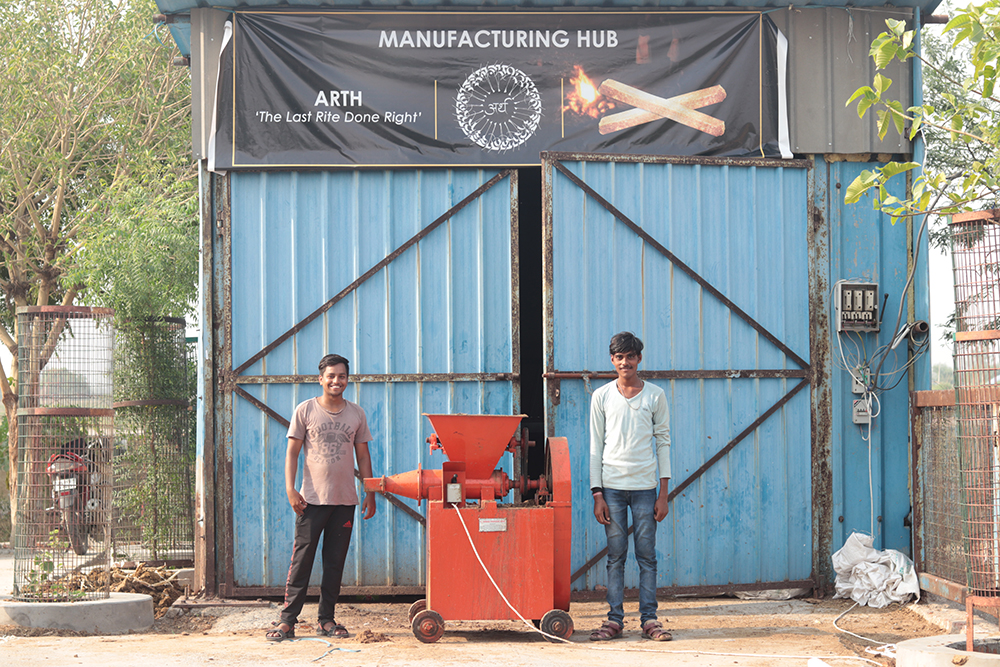Cremations in India are a ritual that dates back several thousands of years. But they are hugely polluting, and often overlooked in the name of culture. Arth is a community group in India who found a solution that honours religion and the environment. So what’s the answer? Cow dung.
Arth strive to add meaning to the last rite. Every year, approximately 8.2 million cremations take place in India, which results in the deforestation of around 16.4 million trees. Now consider this: every day, 1.6 lakh tonnes of cow dung is wasted. It’s either thrown into rivers and drains or simply left to decompose.
Arth, a small community of thoughtful and committed citizens in India, found one solution to both problems: Arth logs. Its logs are made of biomass fuel consisting primarily of cow dung and are used in place of firewood in cremations. The fuel has been researched and developed in the labs of IIT Delhi to improve the efficiency and fuel combustion properties. Here we break down the process.
We recently caught up with Raghav Ajisaria, Founder of Arth to find out more.
So, here’s the problem
More than 85% of people in India are cremated. This practice has been going on for over 2,000 years now. But the consequences to nature as a result of wood cremation always goes unnoticed. A traditional Hindu funeral pyre burns anything between 400 to 500 kilograms of wood and takes over six hours. In India, more than 8.2 million wood-based cremations are done every year. This leads to the deforestation of 16.4 million trees per year. This many trees could save 54 million tonnes of carbon dioxide from entering into the atmosphere. But air pollution and deforestation are not the only environmental threats caused by cremation — they also generate large quantities of ash, which are later thrown into rivers and add to the toxicity of the waters.
The impact

According to a journal called Nature, more than three million people across the world die prematurely because of outdoor pollution, and China and India lead this pack. To find an ecological and culturally acceptable solution, Arth examined the process of using cow dung during the cremation process. According to Hindu scriptures, cow dung is considered as sacred and pious. So we looked at the dairy farming industry in India.
Dairy farming and numerous cow shelters together generate a lot of bio-waste in the form of cow dung. The large heaps of cow dung are a major problem in gaushalas (protective shelters for cows) since they lack an efficient means to convert cow dung into a useful resource. In fact, the gaushalas near Yamuna throw their cow dung into the river where it overflows during heavy rain. Then, due to lack of space, it is then transported to landfills where it adds to the quantum of municipal waste. In India, 1.6 lac tonnes of cow dung is wasted every day, clogging drains and polluting groundwater, or is simply left to decompose. Not only is it unhygienic and spreads diseases like malaria, diarrhoea and, hepatitis, but it also releases extremely harmful gases into the air. Currently, there is no efficient method to dispose of this humongous amount of cow dung.
The solution
Arth has come up with a unique and novel solution. That is: replace wooden logs used in cremations with cow dung logs. Arth logs are made from cow dung, wood shavings, and bagasse before they are baked at a very high temperature. They can then be used as a substitute for wooden logs in cremations.
The logs, developed by our researchers at IIT Delhi, burn better and reduce harmful gases in the atmosphere. They have a high ecological value and reverse the carbon footprint. This feat by Arth reduces two entire trees per cremation. Also, with the cow dung saved by using it in logs, Arth significantly impacts water pollution by helping to keep rivers and drains clean and disposing of cow dung more hygienically and efficiently.

It doesn’t stop here
Unlike electric cremation and other services, which are environmentally impactful but culturally unacceptable, Arth is mindful of Indian values and mindset. Keeping in focus the sanctity of the Hindu ritual of Antim-Sanskara, they have devised a mechanism for fulfilling the cultural aesthetics without compromising on Mother (e)Arth.
Recently, they set up a pilot hub at a partner gaushala. They aim to set up a fully functioning supply chain, optimise the production process, and set up an inventory of Arth logs in the next two months.
Within three years, they will have:
– Prevented escape of 2.3 million tonnes of carbon dioxide
– Prevented escape of 4,500 tonnes kgs of methane.
– Provided INR 40 crores in wages
Final musings….
The role we play in this world should not be limited to what we do in life, but also be extended beyond it. Let’s embrace scientific advancement and stay true to our cultural sentiments by joining us in this quest for a brighter and better world for future generations.
Get a better look at how Arth is helping people perform the last rites of their loved ones in an ecofriendly and innovative way.
Learn more about Arth on their website and connect with them on Instagram and e-mail.
Image via David Gilkey/NPR

